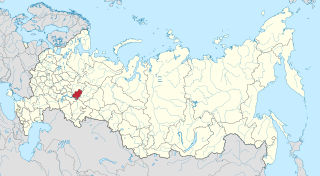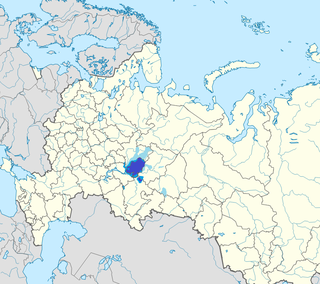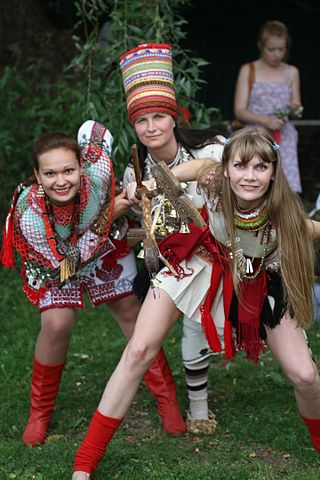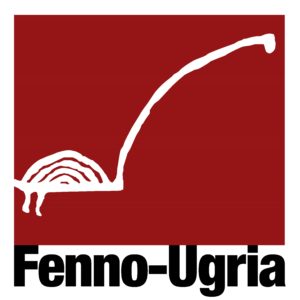
Finno-Ugric or Finno-Ugrian (Fenno-Ugrian) is a traditional grouping of all languages in the Uralic language family except the Samoyedic languages. Its formerly commonly accepted status as a subfamily of Uralic is based on criteria formulated in the 19th century and is criticized by some contemporary linguists such as Tapani Salminen and Ante Aikio as inaccurate and misleading. The three most-spoken Uralic languages, Hungarian, Finnish, and Estonian, are all included in Finno-Ugric.

Music of Russia denotes music produced from Russia and/or by Russians. Russia is a large and culturally diverse country, with many ethnic groups, each with their own locally developed music. Russian music also includes significant contributions from ethnic minorities, who populated the Russian Empire, the Soviet Union and modern-day Russia. Russian music went through a long history, beginning with ritual folk songs and the sacred music of the Russian Orthodox Church. The 19th century saw the rise of highly acclaimed Russian classical music, and in the 20th century major contributions by various composers such as Igor Stravinsky as well as Soviet composers, while the modern styles of Russian popular music developed, including Russian rock, Russian hip hop and Russian pop.

Azerbaijani music is the musical tradition of the Azerbaijani people from Azerbaijan Republic. Azerbaijani music has evolved under the badge of monody, producing rhythmically diverse melodies. Music from Azerbaijan has a branch mode system, where chromatisation of major and minor scales is of great importance.
The Udmurts are a Permian (Finno-Ugric) ethnic group in Eastern Europe, who speak the Udmurt language. During the course of the Russian Empire, Udmurts have been referred to mainly as Chud Otyatskaya, Otyaks, Wotyaks or Votyaks, all being exonyms. Today such exonyms are considered offensive by Udmurts themselves and are mainly used against those who have forgotten the Udmurt language. The Udmurts are close to Komis to their north both linguistically and culturally.

Udmurtia, officially the Udmurt Republic, is a republic of Russia located in Eastern Europe. It is administratively part of the Volga Federal District. Its capital is the city of Izhevsk.

The Komi are an Indigenous Permian ethnic group whose homeland is in the northeast of European Russia around the basins of the Vychegda, Pechora and Kama rivers. They mostly reside in the Komi Republic, Perm Krai, Murmansk Oblast, Khanty–Mansi Autonomous Okrug, and Yamalo-Nenets Autonomous Okrug in the Russian Federation.
The Komi language, also known as Zyran, Zyrian or Komi-Zyryan, is one of the two regional varieties of the pluricentric Komi language, the other regional variety being Permyak.

Udmurt is a Permic language spoken by the Udmurt people who are native to Udmurtia. As a Uralic language, it is distantly related to languages such as Finnish, Estonian, Mansi, Khanty, and Hungarian. The Udmurt language is co-official with Russian within Udmurtia.
Tatarstan is an autonomous republic within Russia, where the largest ethnic group are the Tatars. Their traditional music is a mixture of Turkic, Mongolic and Finno-Ugric elements, reportedly bridging Mongolian and Hungarian music. Nonetheless, the most distinguishing feature of Tatar music is the pentatonic scale, which aligns it with the Chinese and Vietnamese musical traditions. Instrumental dance music, secular song and sacred music are all a part of Tatar folk music. Instrumentation includes the kubyz, surnay, quray (flute) and garmon-talianka.

The Permic or Permian languages are a branch of the Uralic language family. They are spoken in several regions to the west of the Ural Mountains within the Russian Federation. The total number of speakers is around 950,000, of which around 550,000 speak the most widely spoken language, Udmurt. Like other Uralic languages, the Permic languages are primarily agglutinative and have a rich system of grammatical cases. Unlike many others, they do not have vowel harmony.

The Volga Finns are a historical group of indigenous peoples of Russia living in the vicinity of the Volga, who speak Uralic languages. Their modern representatives are the Mari people, the Erzya and the Moksha Mordvins, as well as speakers of the extinct Merya, Muromian and Meshchera languages. The Permians are sometimes also grouped as Volga Finns.

The Permians or Perm Finns are the peoples who speak the Permic languages, a branch of the Uralic language family, and include Komis, Udmurts, and Besermyans. Formerly the name Bjarmians was also used to describe these peoples. Recent research on the Finno-Ugric substrate in northern Russian dialects suggests that in Bjarmaland there once lived speakers of other Finno-Ugric languages beside the Permians.

Kuzma Pavlovich Chaynikov, better known as Kuzebay Gerd was an Udmurt language poet, a prose writer, a playwright, a public figure, and a nationalist. He was executed in Sandarmokh during the Great Purge and was posthumously rehabilitated (exonerated) in 1958.
Udmurt Vos is the ethnic religious revival of the Udmurts, a Finno-Ugrian people inhabiting the republic of Udmurtia in Russia. Among the Udmurts, as in other Finno-Ugrian republics in the Volga region, the revival of paganism is inextricably intertwined with the revival of national-ethnic culture and awareness.
Uralic neopaganism encompasses contemporary movements which have been reviving or revitalising the ethnic religions of the various peoples who speak Uralic languages. The movement has taken place since the 1980s and 1990s, after the collapse of the Soviet Union and alongside the ethnonational and cultural reawakening of the Finnic peoples of Russia, the Estonians and the Finns. In fact, Neopagan movements in Finland and Estonia have much older roots, dating from the early 20th century.

Oyme is a Russian folk music band, playing traditional music of the Erzya and Moksha and other Finno-Ugric peoples.
Budinos is a constructed language designed by to be an international auxiliary language for speakers of Finno-Ugric languages. Budinos builds mainly on Udmurt and Hungarian but also has features from Finnish, Estonian, Mari, and other related languages.

World Congress of Finno-Ugric Peoples is the representative forum of Finno-Ugric and Samoyedic people. The forum is not related to any government or political party. The goals of the forum is to "develop and protect national identity, cultures and languages of Finno-Ugric peoples, to promote cooperation between Finno-Ugric peoples, to discuss topical issues and to identify solutions, and to realise the right of Finno-Ugric peoples to self-determination in accordance with international norms and principles".

Separatism in Russia refers to bids for secession or autonomy for certain federal subjects or areas of the Russian Federation. Historically there have been many attempts to break away from the Russian Empire and the Soviet Union but modern separatism took shape in Russia after the dissolution of the Soviet Union and the annexation of Crimea. Separatism in modern Russia was at its biggest in the 1990s and early 2000s. The topic became relevant again after the 2022-2023 Russian invasion of Ukraine. The primary causes of separatism are nationalism in the republics, economic dependency, and geographic isolation.











